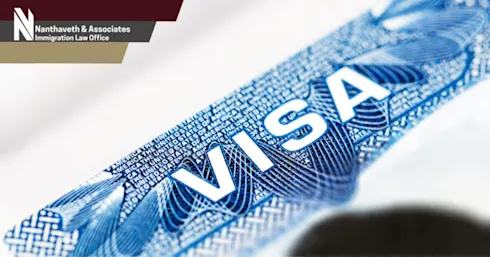Your Complete Guide to Visas in the United States
If you are looking to travel or work in the United States, you will need to obtain the appropriate visa. There are a variety of visas available, depending on your purpose for visiting. Nanthaveth & Associates Immigration Law Office can help you determine which visa is right for you and guide you through the application process.


Visas Based on Family Relationships
If you have relatives who are citizens or permanent residents of the United States, you may be eligible for a visa based on your relationship to them. Family visas are among the most common types issued.
Visas for Family Members of U.S. Citizens
Immediate relatives of U.S. citizens, such as spouses, children, and parents, can obtain a visa without having to wait for an immigrant petition to be approved. Other family members of U.S. citizens, such as siblings or grandparents, must wait for an immigrant petition to be approved before they can apply for a visa.
Visas for Family Members of Permanent Residents
If you have relatives who are permanent residents of the United States, you may be eligible for a visa based on your relationship to them. However, there is usually a waiting list for these visas, so it could take several years before you are able to apply for one.
Preference Categories for Family-Based Visas
There are four preference categories for family-based visas:
- Immediate relatives of U.S. citizens
- Unmarried children of U.S. citizens
- Spouses and unmarried children of permanent residents
- Married children of U.S. citizens
The first two categories are given priority over the others.
How Many Visas Are Available for Family Immigration Each Year?

Immediate family members (spouses, unmarried children under the age of 21, and parents of U.S. citizens - as long as the citizen is over the age of 21, as well as spouses and unmarried children under the age of 21 of U.S. lawful permanent residents) of U.S. citizens don't have to wait for a visa. However, there are caps on the number of visas available to other family members of U.S. citizens, as well as the non-immediate family members of lawful permanent residents.
Why Does it Take So Long for Family Members to Get a Visa Based on Preference Categories?
The wait times for a visa in the preference categories are based on the demand for visas. For example, if more people apply for a visa in the first preference category than there are visas available, then there will be a waiting list. The waiting list is based on the date that the immigrant petition was filed.
Visas for Victims of Domestic Violence
If you are a victim of domestic violence, you may be eligible for a special visa that will allow you to remain in the United States and eventually apply for permanent residency. The Violence Against Women Act (VAWA) provides for two types of visas for victims of domestic violence:
- The U nonimmigrant visa, also known as the U visa
- The VAWA self-petitioner green card
To be eligible for a U visa, you must have been the victim of a crime that occurred in the United States and you must be helpful to law enforcement in the investigation or prosecution of the crime.
To be eligible for a VAWA self-petitioner green card, you must be the victim of battery or extreme cruelty by your U.S. citizen or lawful permanent resident spouse, parent, or child, or by your U.S. citizen step-parent or step-child.
Business Visas
If you are coming to the United States to conduct business, such as for a meeting, conference, or negotiation, you will need to obtain a business visa. To be eligible for a B-1 visa, you must be able to demonstrate that you are coming to the United States for a legitimate business purpose, such as to consult with business associates, attend a business convention, or negotiate a contract.
If you are coming to the United States to work, you will need to obtain a work visa. There are several different types of work visas, each with its own eligibility requirements. For example, the H-1B visa is for workers in "specialty occupations" such as engineering, science, or computer programming. To be eligible for an H-1B visa, you must have a job offer from a U.S. employer and have the appropriate education or work experience for the position.
List of Nonimmigrant Work Visas Available in the United States
- H-1B visa: for workers in "specialty occupations"
- H-2A visa: for agricultural workers
- H-2B visa: for seasonal non-agricultural workers
- H-3 trainee or special education visitor visa: for trainees coming to the U.S. to receive training in which they will not receive academic credit
- L-1 visa: for intracompany transferees
- O-1 visa: for workers with extraordinary ability or achievement
- P-1 visa: for athletes, entertainers, and artists
- Q-1 visa: for cultural exchange visitors
- R-1 religious worker visa: for religious workers
- TN visa: for Canadian and Mexican citizens under NAFTA
List of Immigrant Work Visas Available in the United States
- EB-1 visa: for workers with extraordinary ability, outstanding professors and researchers, or certain multi-national executives and managers
- EB-2 visa: for workers with advanced degrees or with exceptional ability
- EB-3 visa: for skilled workers, professionals, and other workers
- EB-4 visa: for certain religious workers, broadcast journalists, and employees of international organizations
- EB-5 visa: for investors
 Visitor Visas for Tourism
Visitor Visas for Tourism
If you are coming to the United States for tourism, you will need to obtain a visitor visa.
To be eligible for a visitor visa, you must demonstrate that you have a legitimate reason for coming to the United States, such as for sightseeing, visiting friends or family, or attending a business conference.
You must also be able to demonstrate that you have ties to your home country and that you will return there after your trip to the United States.
Common Questions About Getting a Visa to Come to the United States
Check out these common questions about getting a visa to visit or work in the U.S., and if you don't see the answer you need here, call our office for help.
How Long Can You Stay in the U.S. on a Visa?
The length of time you can stay in the United States on a visa depends on the type of visa you have. For example, if you have a visitor visa, you can generally stay in the United States for up to six months. If you have a work visa, the length of time you can stay will depend on the specific type of work visa you have.
What Are the Restrictions on Visas?
There are some restrictions on visas that you should be aware of before you travel to the United States. For example, if you have a visitor visa, you are not allowed to work in the United States. If you have a work visa, you are only allowed to work for the employer that sponsored your visa.
Can You Change Your Status From a Visitor to a Worker?
Yes, it is possible to change your status from a visitor to a worker, but you will need to obtain the appropriate work visa before you begin working. It is not possible to change your status from a visitor to a worker while you are in the United States.
Can You Bring Your Family With You on a Work Visa?
Yes, you can usually bring your spouse and children with you on a work visa. However, they will need to obtain their own visas.
What Happens if You Overstay Your Visa?
If you overstay your visa, you will be subject to removal from the United States. You may also be barred from returning to the United States for a period of time, or you may be permanently ineligible for a visa.
Can You Apply for Citizenship if You Have a Visa?
No, having a visa does not entitle you to citizenship in the United States. To become a U.S. citizen, you must have a green card and then go through the naturalization process.

11211 Taylor Draper Lane Suite 107
Austin, TX 78759
Tel: (512) 828-3791
Hours: 8:00 AM - 6:00 PM
Payment: all major credit cards, cash, check, money orders, cashiers check
Directions To Our Office
Areas Of Service
Copyright © 2025 | Nanthaveth & Associates | Immigration Law Firm Marketing Specialist MarketCrest
Not all consultations are free, and they are not all conducted by Vi Nanthaveth.
